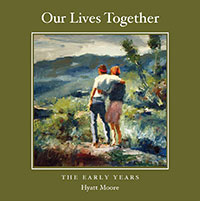Excerpted from a letter to one of my sisters in response to wondering how it was in the “good old days.”
Only four years of my growing up was spent on the homestead but those are my most vivid memories. When we lived in town we usually had a bathroom, but not always. Never, of course, on the homestead.
One hard task that my brothers had to do, and sometimes me, was to carry water. In the winter we got it from the creek, 50 or so yards from our house. When it was really cold Daddy would chop a hole in the ice so we could dip a bucket into the water.
We used that water for everything; it was clean and pure and tasted good.
In the summer we did not use the creek water for drinking or cooking as it was fouled by the cows on the open range. Instead we got water from a spring up on the hill above the house. Dad scooped it out and built a wood box around it with a lid so animals could not get into it. It was wonderful spring water.
It was our job to carry buckets of water from that spring down a narrow steep path to the house–a LOT OF WORK.
Washing the clothes was an all day task.
When my mother washed, she put a galvanized boiler on the stove, covering two burners. My brothers had to keep that boiler refilled with water all day and keep the wood box filled so the fire could be kept going.
In the summer sometimes my mother would do her washing out on the “porch.” That was a landing off the kitchen with no railing. She used two galvanized tubs, a washboard, and P&G bar soap, although people with more money used Fels Naptha. Sometimes she made her own soap, using ashes and meat drippings.
After using the board that was set in one of the tubs, she threw the clothes into the other tub to be rinsed and then wrung out by hand. Or they were put into the boiler. Hence the expression “boiled shirt.”
The colored clothes were not boiled. The hot water and harsh soap, and their being rubbed on the washboard made them fade soon. But the white clothes could stand the boiling as they were pure cotton and heavy material.
It was my job to hang the clothes on a wire line outside. Sometimes in winter the clothes would freeze before I could get the clothespins fastened to the line. Between loads I would often have to go inside to warm my hands.
Clothes would be as stiff as a board but eventually they would defrost from the wind. At least not as much ironing was needed. My mother did not iron sheets and pillowcases, as some housewives did, but there were lots of shirts and dresses that required it.
We never heard of fads or name brands. We were just thankful to have ANYTHING to wear. I can remember my mother getting us ready to go to school or church, looking us over and saying, WELL, YOU’RE CLEAN AND YOUR NAKEDNESS IS COVERED AND I GUESS THAT IS ALL THAT MATTERS. Being clean was the main thing with her.
No wonder that to this day style is not important to me.
__________
Vernon is being gradually weaned from his coma. For updates go here.

 Our Lives Together
Our Lives Together Its About Life
Its About Life
2:53 pm
I’ve heard her talk about this before, and how grandma’s hands would get so raw. It is humbling and incredible to think that this is just one generation removed from us.
3:55 pm
We have no idea how easy we have it compared to what they did just for the every day necessities.
6:01 am
Thanks again Hyatt. I love the stories.
4:40 pm
Brings back vivid memories from my immigrant days in 1950 in Canada, no electricity, no water, no gas, no sewer, no phone, school bus, no money, no nothing. Except muscles and work and effort and time, and axes, buckets, and tiredness.
Thanks for the flashbacks.
Jack
6:50 am
This was fascinating. Wow.
Pastor Adam Barton
Akron, OH
8:36 pm
I loved reading this! As an earlier commenter said, we have it SO easy! I will try to remember this post tomorrow on my laundry day when I want to fuss about all of the ironing I have to do in the summer when we use the clothesline!